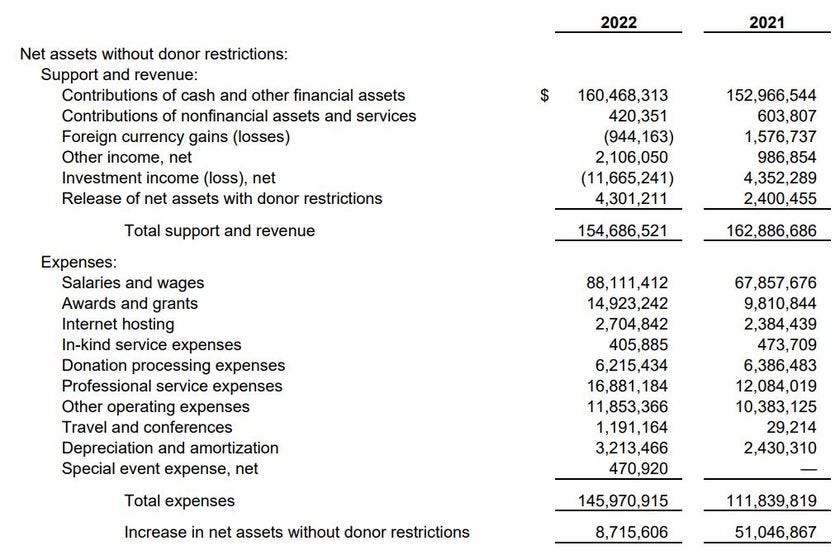Wikipedia isn’t what you think it is.
You might think you've got Wikipedia all figured out, but the truth is, it's a world much deeper and nuanced than you might have imagined.
Wikipedia: The Unsung Hero of the Internet
Wikipedia stands as a special place, a tranquil oasis amidst the turbulent seas of the internet. We've all been there, whether for academic research, the pursuit of quirky trivia, or settling heated debates.
Wikipedia has been consistently ranked among the top 10 most visited websites in the past decade. Currently, it is the 5th most visited website, with 6.6 billion monthly views. Those numbers would have any Venture Capitalist drooling. However, unlike other websites, Wikipedia has never monetized users' data or screen time through ads. This unique approach obviously makes it stand out. Jimmy Wales, the founder of Wikipedia, described the website as "the opposite of Elon Musk." Wikipedia says it takes its decisions slowly based on its long-term mission and uses a community-minded approach.
However, this reinsuring feeling hides a more complex and nuanced reality of what Wikipedia truly is. Particularly, we’ll look into the mechanisms to settle edit debates and the financial reality behind the Wikimedia Foundation, the non-profit organization behind Wikipedia.
Community Built
One of the most well-known pillars of Wikipedia is its community and the ability for anyone to contribute their knowledge. The 59 million articles were written thanks to over 45 million volunteer contributors. Anyone can create content following the set of rules while also participating in the self-policing force, checking up on content created by others. The whole community is shaped like a pyramid, as increased ranking requires more participation and credentials but also grants more rights. The highest ranks of power editors are gained through a community vote, reinforcing and perpetuating the system.
This implies that Wikipedia’s early years were crucial in setting up the community, and the current state is a continuation of that core. It also means that biases existing in the initial group of power editors were reproduced and amplified. More interestingly, when looking at the biggest motives for editors in those early days, they self-reportedly answered "fun,” "ideology," and "values.” This doesn’t fit well with Wikipedia’s second pillar: neutrality of point of view.
Let’s dig into that and understand what it means.
Wikipedia's Limits: The Boundary Between Truth and Opinion
One example was the dispute that arose after the US Commerce Department reported negative GDP growth for the second consecutive quarter in Q2 2022, a common indicator of a recession. President Biden and Treasury Secretary Janet Yellen sparked controversy by downplaying the notion of a recession, leading to conflicting edits on Wikipedia.
After an edit is submitted, it undergoes scrutiny with no fixed criteria for validity. The 5th pillar states it explicitly: Wikipedia has no firm rules. Therefore, users must vote to maintain the quality and, ultimately, the reputation of the website. This is vital because Wikipedia relies on users' monetary contributions to continue operating.
The editing of the "recession" page was temporarily stopped. Some users made edits that were deemed biased toward a certain political view - emphasizing the short definition of two consecutive quarters of negative growth. Other Wikipedia editors aimed to restore Julius Shiskin's broader definition, which added other dimensions, such as depth and diffusion. The page was ultimately "semi-protected,” preventing new and unregistered users from editing.
This apparently benign situation has profound political consequences on the perception of the Biden administration. The perception of economic policies plays a crucial role in influencing the outcome of future elections. Because of the rough nature of the definition of a recession, the appreciation of the situation by Wikipedia editors heavily relied on their conviction and the voting process. Had the top users been more Republican-leaning, the situation could have played totally differently.
Ultimately, Wikipedia itself is not self-consistent as the French page for recession refers to the definition of the French Institute for Statistics and Economical Studies (INSEE) that states that “A recession is most often defined as a decline in Gross Domestic Product (GDP) over at least two consecutive quarters.” Who’s to say the French or American definition is the right one? You can have your own opinion, but on Wikipedia, the power editors have the final say.
Wikipedia's Finance: Money Matters
Another interesting aspect of Wikipedia is its finances and the communication around it. Wikimedia Foundation, the NGO overseeing Wikipedia’s activity, received annual donations totaling around $162 million in 2021. Despite the frequent alarming tone of their fundraising, the annual server costs were a mere 1.5% of Revenue with $2.4 million. The organization also spent $67 million on salaries and $10 million on grants and awards. An in-depth look into the audited financial statements raises eyebrows.
Wikipedia is a hidden financial giant, reporting a surplus of over $50 million in 2021 alone. To put that in perspective, Twitter lost $220 million in the same year. If Wikipedia were a corporation, it would outshine many flashy startups.
So what is this money used for if not for the server costs? Wikimedia's $200+ million endowment is managed by the Tides Foundation. The foundation is a politically oriented organization working to advance progressive causes in other domains than Wikipedia’s mission, raising transparency and political bias concerns.
Wikipedia's financial situation is far from dire despite the urgent tone of its fundraising. This situation sparked controversy among the editor community in late 2022, as they deemed the tone of the fundraising pleas misleading. Wikipedia could survive several years without donations. With substantial surpluses and donations diverted to political and equity-related causes, the situation also raises questions about the alignment of Wikimedia's financial activities with its mission of providing free, neutral knowledge to the world. At the core of Wikipedia, a non-profit organization, lies money.
So, what’s Wikipedia really about?
At the end of the day, Wikipedia is a valuable tool to document knowledge on plain topics. It excels at being accessible. However, when controversy arises, Wikipedia is about the collective viewpoints of its strongest editors. As the debate process over heated topics is not immediately apparent to users, it leads to a system where power users shape information and hide all opposing views. The website's alignment with its mission is questionable due to strong financial incentives from the overarching foundation. Wikipedia consolidates already existing knowledge and provides easy access to it but doesn’t provide a framework to produce it in a truly transparent and bottom-up way.







